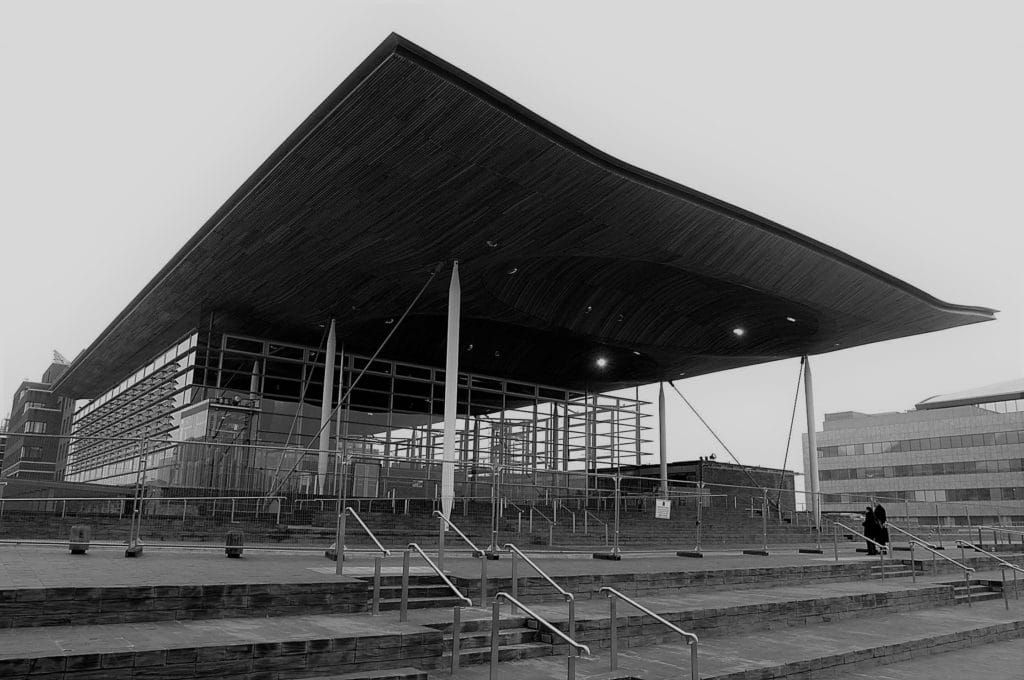In a year mired by the cost-of-living crisis, the legacy of Covid-19 and record inflationary pressures, the Welsh Government has been attempting to implement its most ambitious legislative agenda yet in an increasingly difficult economic environment. We wait to hear an official announcement from Mark Drakeford on the result of ministers’ “unusual” meetings throughout the summer to deal with unprecedented budgetary pressures.
Among the weekly wrangling at FMQs and countless committee hearings, it is easy to lose track of policy developments. With the 2023-24 Senedd term just around the corner, we’ve provided a summary of the Welsh Government’s policy progress and a look ahead to some of the challenges it may face next term in realising its ambitions.
Constitution and Reform
During the First Minister’s legislative statement, he confirmed that the highly anticipated “once in a generation” Senedd Cymru (Members and Elections) Bill will be introduced early in the autumn term. Reforms are being sought, in light of recommendations from the Special Purpose Committee on Senedd Reform, to increase the number of Senedd members from 60 to 96, to be elected using a closed proportional list system. Members are to be elected from 16 six-member constituencies, drawn by pairing the new 32 Westminster constituencies. The Bill will introduce gender quotas for candidates elected to the Senedd, as well as including provisions for a requirement for candidates to, and Members of, the Senedd to be resident in Wales. Mark Drakeford said that other provisions, such as the inclusion of requirements on candidates to declare any political party membership they have held in the 12 months prior to a Senedd election, are being explored. It is an enormous piece of legislation, with real implications for Welsh democracy. With extra members costing an estimated £12m per year, it seems fair to expect calls for the money to instead be spent on frontline public services like the NHS, schools, and local government services to become louder, particularly as councils across Wales warn they may have to limit their spending on statutory services only.
This legislative year, we can also expect bills to be brought forward to simplify and strengthen electoral administration and a Local Government Finance Bill to reform council tax and non-domestic rates. Speaking in Plenary, Mark Drakeford said the Bill will be broader than expanding bands and revaluations and will focus on improving efficiency around exemptions and discounts.
There is much to be anticipated from the Independent Commission on the Constitutional Future of Wales’ final report due by the end of the year. The Commission’s interim report in December 2022 said it would review the case for expanding devolved powers, such as the recommendations of Lord Thomas’ Commission on Justice in Wales that justice and policing are devolved to Wales. While this is something the Welsh Government is pursuing as part of its Programme for Government, it may not be an easy journey, with Gordon Brown’s A New Britain report published on behalf of UK Labour only recommending the devolution of youth justice and probation should Labour come to power at the next general election.
Health & Social Care
The Welsh Government has frequently come under close scrutiny as it grappled with a wave of NHS strikes, while health boards struggle to manage their spending. With major health unions on strike, the NHS was put under additional pressure before it could recover from the impact of the Covid-19 pandemic, and we saw record waiting times and a huge planned care backlog as a result. Following what the minister labelled as “tough negotiations,” the Agenda for Change staff accepted the government’s two year pay offer with further enhancements of the non-pay elements. The government reiterated that it remains committed to working with unions to resolve disputes through its social partnership approach, however this relationship is to continue to be tested in the current climate of inflationary and financial pressures.
The government was also held accountable for the performance of Betsi Cadwaladr University Health Board in North Wales. Over the course of the year, reports have emerged highlighting poor practice, weak leadership structures and incorrect, even fraudulent, accounting entries. Additionally, the minister was widely criticised for the way she dismissed the health board’s independent members when it was put in special measures, with critics arguing senior executives should have been held accountable. Health minister Eluned Morgan admitted that NHS accountability needed to be reviewed and set up an advisory group to that end. As their work is ongoing and troubles at the health board continues to take up column inches, we can expect to see the questions of accountability continuing to be raised in Y Siambr.
Perhaps the most notable health development last year was the establishment of the NHS Executive, which the minister defined as “a small, strengthened senior team within Welsh Government, bolstered and complemented by the bringing together of existing expertise and capacity from national bodies in the NHS.” It will be tasked with overseeing the implementation of new NHS duties and the delivery of the new Cancer Improvement Plan and the National Workforce Implementation Plan. The success of this enterprise, as well as the roll-out of the NHS Wales App, is certainly something to watch out for in the upcoming year. We also await more detail on how the Senedd’s Covid-19 Inquiry Special Purpose Committee will operate after ministers were grilled by the UK Covid Inquiry in July.
Under its Programme for Government commitment to develop services for vulnerable people, the government has consulted on rebalancing how care and support is managed in Wales, with responses being reviewed. This follows similar work in 2021, and a report of an expert group on establishing a National Care Service – a key commitment of the Co-operation Agreement. The government is expected to introduce legislation to eliminate profit from the care of looked after children and legislate to introduce direct payments to carers and those cared for. Julie Morgan, deputy minister, is expected to appear before the Children, Young People and Education Committee on September 14 to scrutinise her response to the committee’s report on radical reform for care experienced children and young people. Despite the FM’s promise for legislation, Ms Morgan refused to place a duty on local authorities to calculate maximum caseloads for children’s social workers.
Climate Change
The Welsh Government’s commitment to tackling climate change was reflected throughout the legislation introduced over the past year. Ministers expedited the Environmental Protection (Single-use Plastic Products) (Wales) Bill (now Act) in an effort to urgently address plastic pollution, which was criticised by Senedd Committees for limiting members’ ability to scrutinise. The Infrastructure (Wales) Bill, introduced in June will be crucial to addressing some of the major administrative barriers hindering the deployment of renewable infrastructure developments, with a more efficient consenting regime set to provide a ‘one-stop-shop’. However, given the powers to address grid capacity and seabed rights do not currently sit with Welsh ministers, further calls for additional reforms at a UK-level are likely to continue over the coming year. Looking ahead to legislation set to be introduced this year, the First Minister has committed to introducing the Disused Tips Safety Bill, after publishing its response to the Law Commission’s Regulating Coal Tip Safety in Wales report in March 2023.
The Minister and Deputy Minister for Climate Change have been working to ensure renewable energy development is not on the back burner. Julie James confirmed that the government would adopt the target for Wales to meet the equivalent of 100% of its annual electricity consumption from renewable sources by 2035, with at least 1.5GW of capacity locally owned. August saw the official launch of the Welsh Government’s community-owned renewable energy company, Ynni Cymru, which was a key part of its Co-operation Agreement with Plaid Cymru. The Ynys Môn-based organisation is considered key to unlocking public support for local renewable projects and accelerating the decarbonisation of the energy system, with £750,000 awarded to eleven projects in the form of resource grants over the next three years. Progress continues to be made on the establishment of the government’s state-owned renewable energy developer, now known as Trydan Gwyrdd Cymru. The launch of the company is scheduled for 2024, with the government keen to ensure local supply chains benefit.
Going into the third year of the Sixth Senedd, we expect the Welsh Government to continue to call on the UK Government to accelerate the transformation of the grid to support new energy connections and the growing adoption of EVs; devolve the assets and management of the Crown Estate to Wales; provide certainty on nuclear at sites in Wylfa and Trawsfynydd; and ensure local supply chains are mandated in future Contracts for Difference rounds.
Transport
The Welsh Government’s transport policies have been strongly resisted over the past year, with members across the Senedd openly critical of the decision to reassess and scrap large road building proposals following the outcome of the Roads Review. MSs, including Labour backbenchers, have warned that those living in north and rural Wales without access to public transport alternatives, will be forced to continue relying on private cars. Another controversial policy, set to be officially rolled out on September 17, is the default 20mph speed limit on restricted roads across Wales. Despite the majority of Welsh Conservatives voting in favour of proposals to introduce the policy in 2020, Tory MSs have since vocally and consistently rejected the plans. Concerns have been raised around the cost of the policy and local authority resources, with a leading expert and council leader calling on the Welsh Government to delay implementation.
The long-awaited Environment (Air Quality and Soundscapes) (Wales) Bill is currently undergoing scrutiny, with a debate proposing that the Senedd agree to the general principles of the Bill tabled for the first Plenary session back after recess. The Bill includes provisions to cut vehicle emissions by tackling vehicle idling and enabling Welsh Ministers to implement Low Emission Zones. Throughout Stage 1 scrutiny, the minister has emphasised that the legislation is part of a suite of measures and “is not intended to be a be-all and end-all for everything to do with clean air”, with a consultation into the Noise and Soundscape Plan for Wales 2023-28 running until October 2. In response to the CCEI Committee’s report on the Bill, the minister reiterated her commitment to consult before introducing a trunk road charging scheme.
The future of Wales’ bus industry remains uncertain, as the government has since cut emergency funding which was extended until July 24. The Confederation of Passenger Transport has warned that “20-25% of the whole network in Wales” could be cut if long-term funding is not provided, leading Age UK to raise concerns around the impact on the elderly. Mark Drakeford has pledged to bring forward the Bus Bill in the next year, after plans were introduced in March 2022 to design an integrated bus transport network, to provide people with a ‘real sustainable transport alternative’ in an effort to end car dependency. The responses to the white paper consultation were published in December 2022. Lee Waters previously acknowledged that the Bill will take “years to properly put in place” but stressed that it is crucial to reforming the bus industry and promoting modal shift.
It is clear that the second phase of the South Wales Metro Project will not be completed in 2023 as originally planned, with delays resulting from Covid-19 meaning it is unlikely to be finished until the end of 2024. Transport for Wales revealed that the cost of the project is expected to be more than £260m higher due to delays and inflation, while the projects in north Wales and Swansea Bay and West Wales face similar challenges.
Education
Turning to Education policy, one area of development has been the ongoing work on the establishment of the Commission for Tertiary Education and Research, which we covered before the start of the Summer recess. Since then, Simon Pirotte has been fully confirmed as its Chief Executive Officer, with the CYPE Committee stating that it was “incredibly disappointed” with the position being awarded via direct appointment; although the committee did agree with Mr Pirotte’s suitability for the role. In terms of CTER’s progression, the Welsh Government recently announced its seven board members, with a consultation on associate membership ongoing until the end of September. Come December, Jeremy Miles is expected to unveil his list of priorities for the tertiary education and research sectors which will act as the basis of the Commission’s work.
The Additional Learning Needs Code for Wales 2021 continued its roll-out over the last academic year. Concerns were raised on numerous occasions in relation to the number of learners in receipt of the old SEN support system being higher than those receiving the new ALN support, to which the Welsh Government said this is a common trend during periods of reform of this nature. Jeremy Miles subtly acknowledged challenges to the roll-out however, given he extended the implementation period from three years to four years in March, taking it up to August 2025. NAHT Cymru has additionally criticised the state of funding for the implementation of the ALN Code, claiming schools were not financially equipped to implement the reforms fully. On June 14, the Welsh Conservatives tabled a motion calling for the Welsh Government to urgently review the roll-out, which passed following government and Plaid Cymru amendments focusing on Estyn’s assessment that the roll-out was making steady progress and concerns over a lack of Welsh-medium resources and services. We expect to see the outcome of the review within the next year, as the ALN Code’s roll-out continues.
On Welsh language policy, the government intends to bring forward a Welsh Language Education Bill this year following its white paper consultation, with responses still being reviewed. The Bill seeks to create a single Welsh language skills continuum to describe skill levels and a statutory National Plan for the acquisition and learning of Welsh. The Commission for Welsh-speaking communities proposed designating “areas of higher density linguistic significance” in parts of Wales where intervention might be needed to sustain Welsh as a community language. The commission’s final report is expected to be published by August 2024, providing policy recommendations to the government. In light of disappointing census results and Welsh-medium teaching workforce challenges, Jeremy Miles be pressured on how achievable his government’s one million Welsh speakers by 2050 target really is.
Housing
In June this year, the Welsh Government took a major step towards delivering the ‘Right to Adequate Housing’ by launching a Green Paper Consultation on its proposals, including the possibility of introducing rent controls for the private sector. The consultation is expected to feed into a white paper published later this year. Together with the coming into force of the Renting Homes Wales Act in December 2022, these policies amount to the biggest shake up in the private renting market since the onset of devolution.
Also in June, Julie James provided an update on progress towards the next iteration of the Warm Homes Programme in Wales, noting her priorities for the scheme– the government’s primary mechanism to tackle fuel poverty. The government recently confirmed that a new Welsh Housing Quality Standard is expected to be published this Autumn, which will require social housing providers to assess energy efficiency and provide target energy pathways for housing stock. One area where the government has made slow progress is towards delivering its 20,000 low carbon homes target, with the rise in construction costs, workforce shortages and phosphate pollution hampering construction. As housebuilding becomes a more salient issue ahead of the next General Election, this is an area ministers may face additional pressure from opposition members in the upcoming Senedd term.
Though introducing an orphan building pilot scheme and legally binding Developers Pact to improve fire safety, a critical Audit Wales report found significant problems facing the building control and building safety profession, and revealed that most local authorities have not outlined how they’re planning to meet the requirements of the Building Safety Act 2022. The government has yet to respond to the report which attracted the attention of the Public Accounts and Public Administration Committee and opposition parties.
Agriculture
It has been a busy year for agriculture, with the Agriculture (Wales) Bill completing its journey through the Senedd to become the Agriculture (Wales) Act. The Act paves the way for the development of a Sustainable Farming Scheme to replace support provided by the Basic Payment Scheme. While the scheme is still under development, and not all aspects are certain, the government says the scheme will provide financial support for farmers to promote the sustainable production of food, mitigate the impacts of climate change, and enhance ecosystems. Support will be provided through a number of different layers, with some actions being required to access support, while other optional actions will result in higher payments. A consultation expected towards the end of the year will help finalise the last details of the scheme, focusing on payment scales, how the scheme will work for tenant and commons farmers, and details around the controversial requirement of 10% woodland coverage for farms. During the summer’s Royal Welsh Show, NFU Cymru discredited this aim as unreasonable, so it’s fair to expect opposition spokespeople to recite this criticism. The Sustainable Farming Scheme will finally be delivered in 2025, and plans around the continuation of Glastir payments are hotly anticipated.
Although Peter Fox’s Food Bill failed at Stage 1, the minister Lesley Griffiths committed to build on the Bill’s aims to establish a more sustainable food system and national food strategy, complemented by local food plans.
Culture
Key Co-operation Agreement commitments have formed the basis of developments in areas of culture policy. One of these key commitments explored the devolution of broadcasting and communication powers. An expert panel on the Shadow Broadcasting and Communications Authority, published its report in August 2023, indicating that the authority should become fully operational after 12 months. A further commitment for the Co-operation Agreement, and of the Programme for Government, was the creation of a National Contemporary Art Gallery. The plan is to establish a network of galleries that will provide increased access to the national collection and bring art closer to communities. Nine venues have been shortlisted as part of the plan, with each venue undergoing a detailed assessment. Work is underway, following expressions of interest, to find a potential anchor site which will provide a prominent public face for the gallery. Questions remain, however, around the feasibility, cost and cohesiveness of the plans amid financial pressures.



